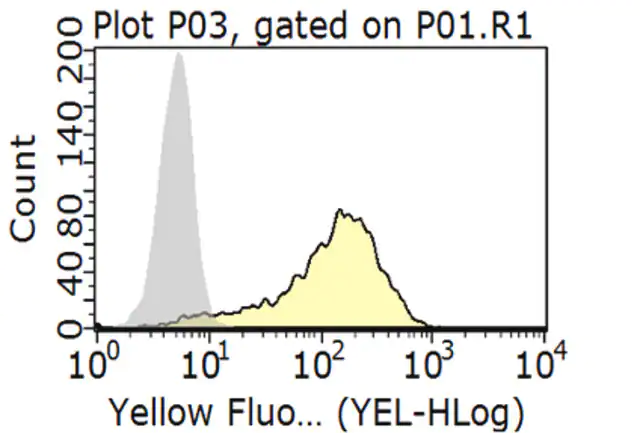您的位置:首页 > 产品中心 > Anti-EPCR Antibody, clone JRK1535
Anti-EPCR Antibody, clone JRK1535

产品别名
Anti-EPCR Antibody, clone JRK1535
Endothelial protein C receptor, Activated protein C receptor, APC receptor, CD201, Endothelial cell protein C receptor
基本信息
| eCl@ss | 32160702 |
| NACRES | NA.41 |
| General description【一般描述】 | Endothelial protein C receptor (UniProt Q9UNN8; also known as Activated protein C receptor, APC receptor, CD201, Endothelial cell protein C receptor) is encoded by the PROCR (also known as EPCR) gene (Gene ID 10544) in human. The coagulation cascade is an evolutionary conserved pathway in vertebrates that maintains vascular integrity. The procoagulant activity of the tssue factor (TF) pathway is counterbalanced by the protein C (PC) anticoagulant pathway to avoid intravascular thrombosis. EPCR is a CD1d–like immune receptor that binds the γ-carboxyl glutamic acid-rich (Gla) domain of PC and markedly improves PC activation in response to thrombin binding to endothelial cell-expressed thrombomodulin. EPCR also serves as the co-receptor for activated PC (aPC) in vascular protective signaling mediated by activation of PAR1. In addition, EPCR is found on hematopoietic, neuronal and epithelial progenitor populations, as well as among highly aggressive basal-like breast cancer subtypes. Endothelial overexpression of EPCR attenuates metastasis, presumably by dampening thrombin generation that supports metastatic tumor cell survival. EPCR-dependent PAR1 activation by aPC also stimulates breast cancer cell migration and prevents apoptosis of lung cancer cells. EPCR-selected populations of breast cancer cells grow as non-adherent spheroids and have high tumorigenicity when injected at low cell numbers. EPCR is initially produced with a signal peptide (a.a. 1-17), the removal of which yields the mature protein with a large extracellular region (a.a. 18-210), followed by a transmembrane domain (a.a. 211-231) and a short cytoplasmic tail (a.a. 232-238). |
| Specificity【特异性】 | Clone JRK1535 blocked activated protein C (APC) from binding cell surface EPCR by targeting a conformational epitope at the extracellular domain (Liaw, P.C., et al. (2001). J. Biol. Chem. 276(11):8364-8370). |
| Immunogen【免疫原】 | Recombinant human EPCR extracellular domain. Epitope: Extracellular domain. |
| Application【应用】 | Anti-EPCR Antibody, clone JRK1535 is an antibody against EPCR for use in Flow Cytometry, Neutralizing. Research Category Signaling Research Sub Category Immunological Signaling Flow Cytometry Analysis: 0.1 µg of this antibody from a representative lot detected EPCR in one million HeLa cells. Flow Cytometry Analysis: A representative lot, when conjugated with fluorescein, detected Doxorubicin (Cat. No. 324380) treatment-induced downregulation of EPCR expression on the surface of HUVECs. Glutathione pretreatment prevented Doxorubicin-induced EPCR downregulation (Woodley-Cook, J., et al. (2006). Mol. Cancer Ther. 5(12):3303-3311). Flow Cytometry Analysis: A representative lot blocked fluorescein-labeled APC from binding exogenously expressed human EPCR on the surface of HEK293 transfectants. When labeled with fluorescein, clone JRK1535 stained HEK293 transfectants expressing human EPCR, but not transfectants expressing murine EPCR (Liaw, P.C., et al. (2001). J. Biol. Chem. 276(11):8364-8370). Neutralizing Analysis: A representative lot inhibited APC generation from acrolein-treated HUVECs exposed to defibrinated, recalcified plasma (Swystun, L.L., et al. (2011). J Thromb Haemost. 9(4):767-775). Neutralizing Analysis: A representative lot selectively affected the survival of sorted EPCR-positive, but not EPCR-negative, MDA-MB-231 mammary fat pad (mfp) cells in cultures. Pretreatment of EPCR-positive cells with clone JRK1535 prior to xenografting also suppressed the tumor-initiating capacity of the EPCR-positive cells in mice vivo (Schaffner, F., et al. (2013). PLoS One. 8(4):e61071). |
| Quality【质量】 | Evaluated by Flow Cytometry in A549 cells. Flow Cytometry Analysis: 0.1 µg of this antibody detected EPCR in one million A549 cells. |
| Physical form【外形】 | Format: Purified Purified mouse monoclonal IgG1κ antibody in PBS without preservatives. Protein G Purified |
| Other Notes【其他说明】 | Concentration: Please refer to lot specific datasheet. |
产品性质
| Quality Level【质量水平】 | 100 |
| biological source【生物来源】 | mouse |
| antibody form【抗体形式】 | purified immunoglobulin |
| antibody product type | primary antibodies |
| clone【克隆】 | JRK1535, monoclonal |
| species reactivity | human |
| should not react with | mouse |
| technique(s) | flow cytometry: suitable neutralization: suitable |
| isotype【同位素/亚型】 | IgG1κ |
| NCBI accession no.【NCBI登记号】 | NP_006395.2 |
| UniProt accession no.【UniProt登记号】 | Q9UNN8 |
| shipped in【运输】 | dry ice |
| Gene Information | human ... PROCR(10544) |
产品说明
| Target description【目标描述】 | 24.80 kDa calculated. Greater than 40 kDa observed due to glycosylation (Woodley-Cook, J., et al. (2006). Mol. Cancer Ther. 5(12):3303-3311). |
| Storage and Stability【储存及稳定性】 | Stable for 1 year at -20°C from date of receipt. Handling Recommendations: Upon receipt and prior to removing the cap, centrifuge the vial and gently mix the solution. Aliquot into microcentrifuge tubes and store at -20°C. Avoid repeated freeze/thaw cycles, which may damage IgG and affect product performance. |
| Disclaimer【免责声明】 | Unless otherwise stated in our catalog or other company documentation accompanying the product(s), our products are intended for research use only and are not to be used for any other purpose, which includes but is not limited to, unauthorized commercial uses, in vitro diagnostic uses, ex vivo or in vivo therapeutic uses or any type of consumption or application to humans or animals. |
安全信息
| Storage Class Code【储存分类代码】 | 12 - Non Combustible Liquids |
| WGK | WGK 2 |





